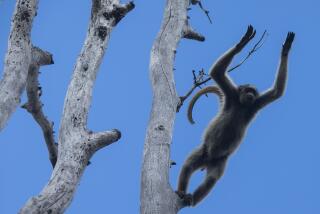LECTURE : Life With Orangutans, in Their Eden
- Share via
“I was born to study orangutans.”
So begins one chapter in the new book by BirutF. Galdikas, “Reflections of Eden: My Years With the Orangutans of Borneo.” That sense of destiny pervades the autobiographical work, which intertwines details of Galdikas’ life with glimpses of her 24 years studying the great apes of Indonesia.
“I think that sometimes in life, several different threads come together” and point the way to a path in life, she said in a telephone interview from Los Angeles. Galdikas, who will give a free lecture Tuesday at Cal State Fullerton, is in the United States to promote her book and to attend to the L.A.-based Orangutan Foundation International, which she founded.
For Galdikas, a defining moment came when she met Louis Leakey, the famed paleoanthropologist, at UCLA in the late ‘60s. Leakey had already helped to send Jane Goodall to Tanzania to study chimpanzees and Dian Fossey to Rwanda to study gorillas.
Galdikas was to become the third of “Leakey’s angels,” as she describes the trio of researchers. Leakey believed that studying the great apes would provide clues about the evolution of humans. He also thought that women had the proper temperament to carry out long-term research under difficult conditions.
*
Orangutans provided perhaps the greatest challenge of the three. Believed to be solitary, living high in the trees, they were virtually unknown to science when Galdikas went to Borneo (part of the nation of Indonesia). In her first year, 1971, even the merest sightings of the red apes were rare. But gradually, they became accustomed to Galdikas’ presence.
Among her discoveries was the fact that orangutans are not as solitary as was believed--they actually have significant social relations. Wild orangutans also have a much longer birth interval than previously thought. And, in a search for tool use as a measure of intelligence (chimpanzees use rudimentary tools) Galdikas found that orangutans will fashion umbrellas from fans of leaves or branches.
Like Goodall and the late Fossey, Galdikas became a spokeswoman for protection of the species, founding Orangutan Foundation International.
By writing the book, she said, she hopes to shed more light on what is still, to the public at least, the least-known of the great apes.
Her talk Tuesday will include discussions of the conservation situation facing the orangutan, reflections on her life in Borneo (she is now an Indonesian citizen, married to a local), and, of course, her experiences with the orangutans themselves at Camp Leakey, her research base. Many of them she has come to know on an individual basis; some she has rescued from captivity.
Borneo, as other tropical areas, has been subject to great losses in habitat over the past two decades. But the “Eden” in the title of her book, Galdikas said, refers not to Borneo as a physical place, but to the lives of her research subjects.
“Eden,” she said, “is the state that humans left behind, but orangutans did not.”
(BEGIN TEXT OF INFOBOX / INFOGRAPHIC)
What: Lecture and book-signing by Birute M. F. Galdikas.
When: Tuesday, March 7, at 1 p.m.
Where: University Center Theater, Cal State Fullerton.
Whereabouts: From the Orange (57) Freeway, exit west on Nutwood Avenue and turn right on State College Boulevard. Parking lot entrances will be on the right.
Wherewithal: FREE.
Where to call: (714) 773-2765.
* LECTURES, Page 22
More to Read
Sign up for our Book Club newsletter
Get the latest news, events and more from the Los Angeles Times Book Club, and help us get L.A. reading and talking.
You may occasionally receive promotional content from the Los Angeles Times.









